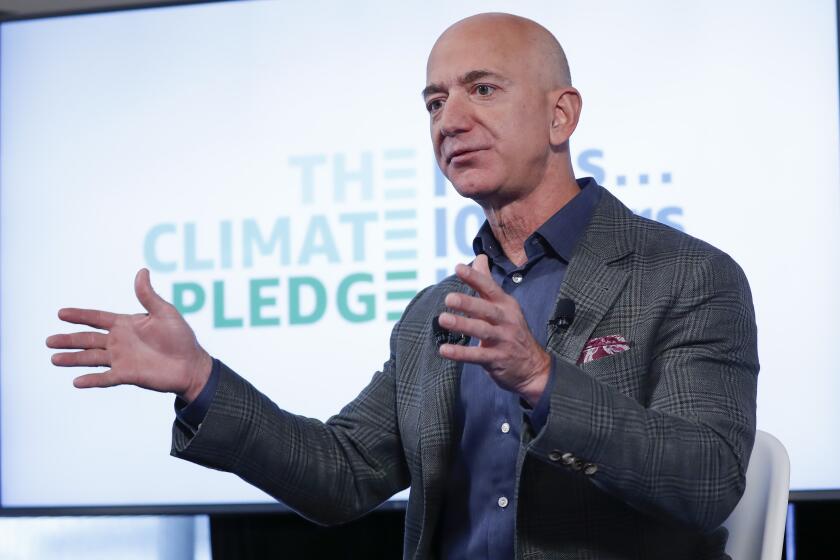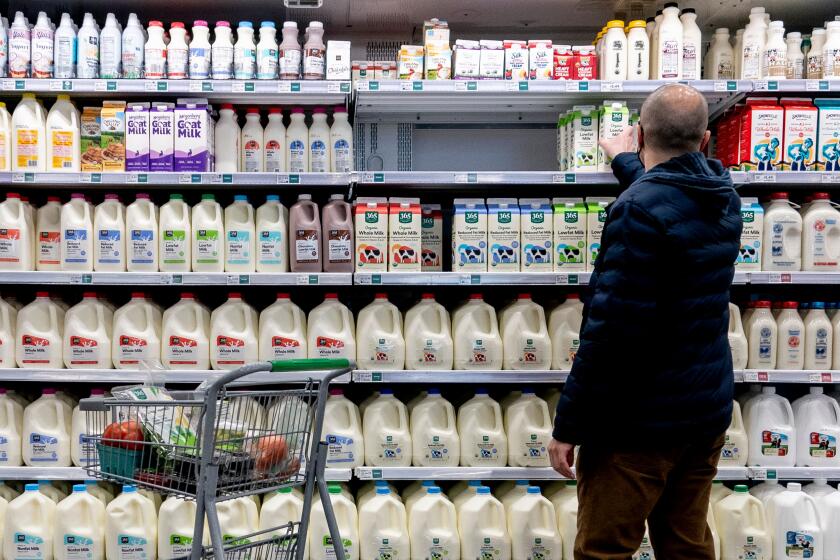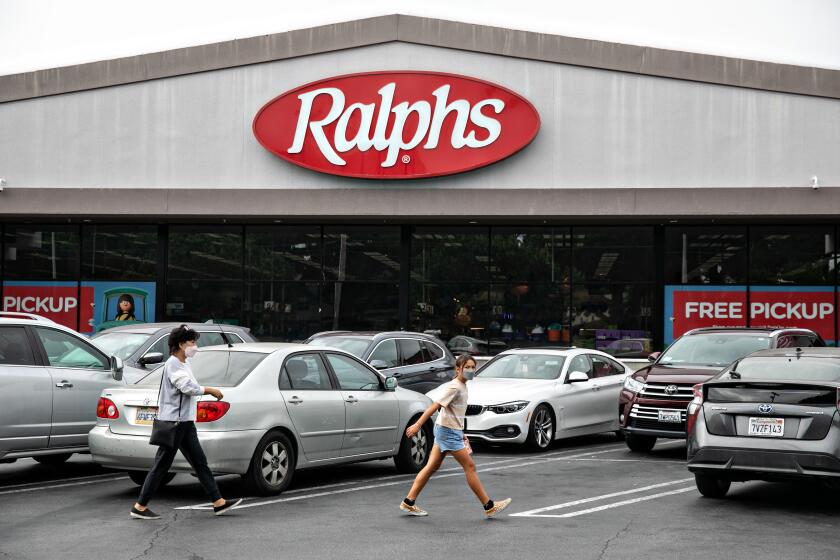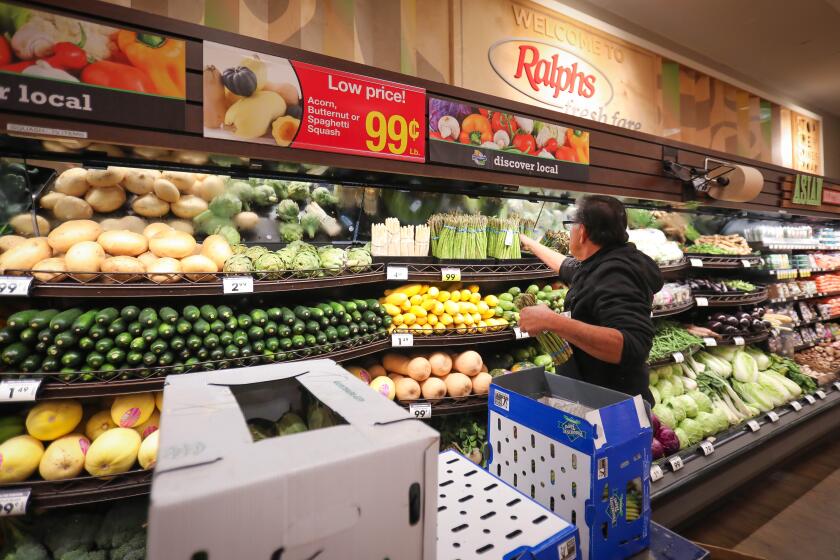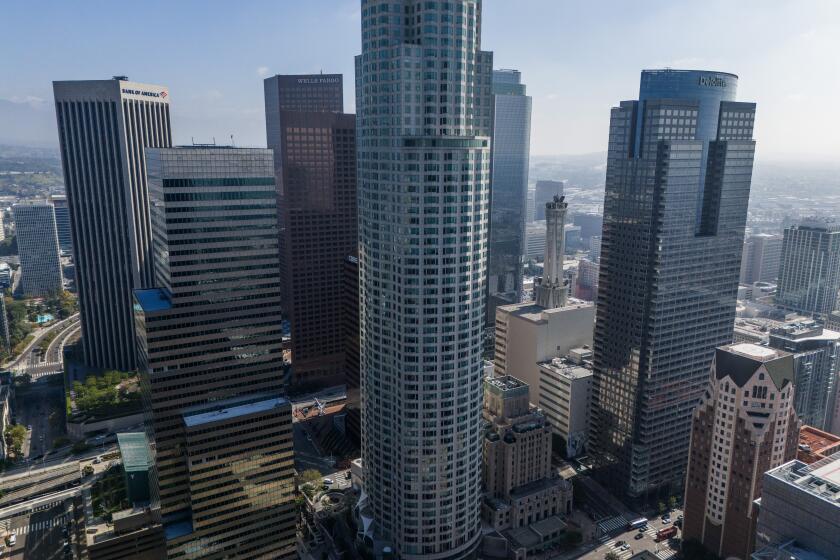Column: Albertsons will pay millions to quash charges that it cheated customers. Shouldn’t that kill its merger plan?

A couple of legal events involving the giant supermarket chain Albertsons — the owner of Vons and Pavilions, among other familiar brands — and the giant chain Kroger, owner of Ralphs and other big supermarket names, are coming together just as the two firms are trying to finalize their $24.6-billion merger.
One is a pending decision expected any day from a federal judge in Oregon, who was asked by the Federal Trade Commission to put the merger on hold until the agency can finish presenting its case against the deal to an administrative law judge. Judge Adrienne Nelson completed a hearing on the FTC’s motion Sept. 17, but hasn’t said when she would rule.
The second legal event was a $3.9-million settlement announced Thursday between Albertsons and the attorneys general of Los Angeles and six other California counties as well as the FTC. At issue in that case were accusations that the chain ripped off customers at hundreds of its Vons, Safeway and Albertsons stores in California.
The conclusion that’s easily drawn is overall prices will increase.
— Albertsons executive on the effect of its merger with Kroger
The plaintiffs accused Albertsons of overcharging customers in part by short-weighting produce, meats, baked goods and other items — that is, selling less product than than its package labels indicated. The company didn’t admit to liability in settling the case, but the terms of the final judgment suggest that the counties and the FTC had the goods — or at least had enough evidence that Albertsons thought it wise to make the case go away.
Albertsons says it has now implemented policies and employee training to ensure that its prices are accurate. The counties, however, noted that it was already under a 2014 court order requiring it to ensure accurate pricing. (The order was issued to Safeway and Vons, but was inherited by Albertsons when it acquired those chains in 2015.) The company also says, “The lawsuit and settlement in California are in no way related to the FTC’s challenge of our merger with Kroger.”
So the question is what this case has to do with the case against its megamerger. The answer is: Plenty.
Get the latest from Michael Hiltzik
Commentary on economics and more from a Pulitzer Prize winner.
You may occasionally receive promotional content from the Los Angeles Times.
That’s because the core of Albertsons’ defense against the FTC’s attack on the merger is that the deal will result in lower prices — and that the agency and customers should take that on faith. So the question of whether the company should be believed is crucial.
The answer is no, for several reasons beyond what the California counties alleged was its dubious pricing. I asked Albertsons for comment on the confluence of these two legal cases, but haven’t received a reply.
Boise, Idaho-based Albertsons and Cincinatti-based Kroger made the prospect of lower prices part of their campaign for public support of the deal virtually from the start.
“We will take the learnings from each company to bring greater value and a better experience to more customers, more associates and more communities,” Kroger Chief Executive Rodney McMullen told analysts and investors in a conference call after the deal was announced.
The lawsuit by the Federal Trade Commission and 17 states shines a light on Amazon’s monopolistic actions that buyers and sellers know all about. But what’s the remedy?
As I observed then, McMullen didn’t explicitly say that would mean lower prices, but it would be a rare shopper who didn’t think that “greater value and a better experience” meant anything other than paying less at the checkout counter.
Anyone who has paid attention to the trajectory of prices on goods and services after a big merger had to know that McMullen was blowing smoke. Mergers virtually never lead to lower prices.
Comcast promised that its 2011 merger with NBCUniversal would open the doors to a paradise of free choice at popular prices. Do you feel you’re spending less for video and internet and getting more? Me neither.
In healthcare, the 2004 acquisition of Woodland Hills-based WellPoint by Indianapolis-based Anthem was supposed to produce immense savings from combining the health insurance companies’ computer systems and allowing customers’ medical data to be exploited for their benefit across the new company’s vast reach.
We’re still waiting for the technological benefits of the WellPoint-Anthem deal to appear 20 years later, along with lower fees. CVS and Aetna made the same claim when they announced their merger in 2017. Lower prices have yet to materialize there too.
Under its chair, Lina Khan, the FTC has placed the inflationary effect of decades of lax antitrust enforcement front and center in justifying its goal of fostering greater competition. Indeed, profiteering by consumer companies untethered by competitive concerns played an unmistakable role in the inflation surge over the last couple of years.
The Fed has ignored how corporate profits drove inflation. That left PepsiCo, Tyson Foods and Procter & Gamble free to jack up prices and blame it on the pandemic and Ukraine war.
The FTC plainly sees the Albertsons-Kroger merger as a key battle in its campaign. It would be the largest supermarket in U.S. history, concocted by the largest and second-largest such chains, which already had expanded through 10 mergers dating to 1983. Between them they own 5,000 stores and 4,000 pharmacies. Traditionally, they have regarded each other as their prime competitor among traditional supermarket chains.
The companies have said that the merger is necessary to enable them to compete with nontraditional grocery stores such as Walmart, Costco and Amazon; the FTC says those other stores aren’t direct competitors of Albertsons and Kroger.
The agency has said explicitly that the two companies’ promises of lower prices post-merger — and higher wages for the workers who don’t lose their jobs in the process — aren’t worth the breeze they waft in on.
In a post-hearing brief, the agency dismissed the companies’ vows “to ‘lower their prices,’ ‘improve their stores,’ and ‘improve associates’ salaries,’’ as “self-serving promises by executives” that the companies themselves acknowledged were “not legally enforceable.”
Noting in its brief that Albertsons’ prices are consistently higher than those at Kroger stores, the FTC introduced evidence that an Albertsons executive had said in a memo that “we all know prices will not go down ... to Kroger levels, therefore the conclusion that’s easily drawn is overall prices will increase.”
In any event, the FTC said, the merged company’s fiduciary responsibility is “to deliver returns to its shareholders — not to lower prices to consumers.”
As for the companies’ pledge to divest enough stores in enough communities to preserve competition, the FTC is right to be skeptical. The companies’ plan is to sell hundreds of stores to New Hampshire-based C&S Wholesale Grocers. C&S currently operates 23 groceries, mostly in upstate New York, Vermont and Wisconsin, as the FTC observed in a court filing. The divestiture would bring C&S at least 413 stores in 18 states and the District of Columbia.
Albertsons says a controversial $4-billion merger dividend is part of its growth strategy. How is taking on debt to funnel money to insiders helping it grow?
C&S, the agency said, will be nothing like “a meaningful competitor that would mitigate a substantial lessening of competition” resulting from the merger. Indeed, a C&S executive testified at the Oregon hearing that it would not function as a full-scale competitor of the merged companies for at least two or three years.
“C&S would be acquiring a patchwork of assets cobbled together by Kroger’s antitrust lawyers,” the FTC said in its motion for an injunction, “not a standalone business likely to succeed.” It’s the public, not the companies, that would “bear the cost of any failure.”
Indeed, this divestiture plan bears alarming similarities to an earlier such scheme, also involving Albertsons. As I reported earlier, the occasion was its $9.4-billion takeover of the Safeway chain in 2014.
The FTC ordered the divestiture of 168 of the 2,400 stores the merged company would own, mostly in the West. More than 140 were acquired by Haggen Holdings, an 18-store chain in the Pacific Northwest.
As it turned out, Haggen was utterly ill-equipped to grow nearly 10-fold overnight. Within months it was laying off workers, and before the year was out it had filed for bankruptcy. Haggen put 100 of the stores back on the block, and 33 of them were bought back by Albertsons — for about one-fifth, on average, of what it had sold them for. The company’s winning bid for some stores was $1 each.
Albertsons and Kroger say their merger would benefit consumers. The history of mergers, in the grocery business and elsewhere, offers cause for skepticism.
When it was all over, a divestiture the FTC had ordered to preserve competition had eliminated all competition in some communities.
The public record suggests that the impulse driving this merger resembles that of most mergers. It’s not about bringing prices down for consumers, or ensuring the survival of the subject companies in the face of ever-stiffening competition, or about having the resources to upgrade stores.
It’s about insiders pocketing the excess capital emitted during the transaction like the carbon dioxide emitted from the tailpipe when your car burns gasoline.
This merger plan, as it happens, threw off a special $4-billion dividend to Albertsons shareholders. Who were these shareholders? I reported in 2022 that they were chiefly six private equity firms and investment and real estate funds that controlled a combined 75% of Albertsons shares.
Three current and former Albertsons executors were also in on the handout. Together with the investment firms, they held a majority of board seats. In other words, as I wrote, they voted themselves a multibillion-dollar handout.
The dividend was temporarily blocked by a state court in Washington, but was eventually paid in early 2023. During the court wrangling, Albertsons claimed the dividend was long-planned and had nothing to do with the merger.
There was a teensy problem with that defense, however, as the companies’ own merger announcement stated explicitly that the $4-billion dividend is “part of the transaction,” and counted the dividend as part of the merger price, accounting for $6.85 per share of the $34.10 per share payable to Albertsons shareholders.
That brings us full circle to Albertsons’ recent settlement of the California counties’ lawsuit. The bottom line is: Can this company be trusted, especially if it gets bigger?
Should we believe its claim that merging with Kroger will bring lower prices to their customers? Or should we give it the same credibility that the FTC does, which is zero, or the credibility that seven California counties found in Albertson’s prices for its packaged foodstuffs, also zero? I’ve presented the data. You make the call.
More to Read
Get the latest from Michael Hiltzik
Commentary on economics and more from a Pulitzer Prize winner.
You may occasionally receive promotional content from the Los Angeles Times.
